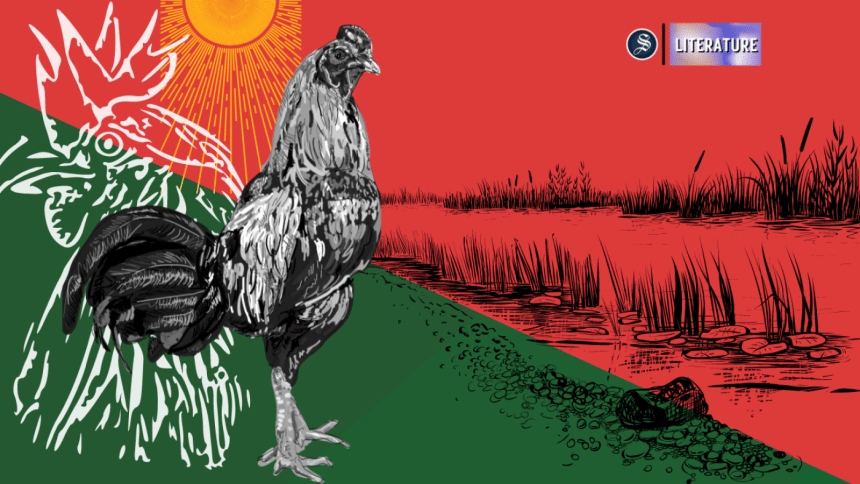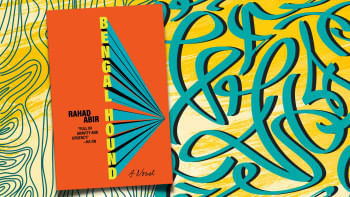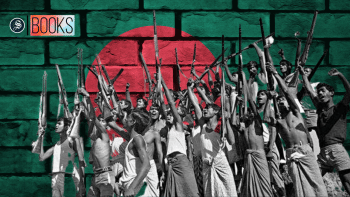Mr Moti

Ameen is 17 when the war breaks out. One Monday evening after supper, he announces he will go to war.
Sonavan shrieks in surprise. You want to leave me alone?
It won't take long, Ma, he assures her. I'll be back soon after training.
That night Sonavan cannot sleep.
After sun-up, she opens the duck coop. The flock streams out, stretches and quacks around her for their morning meal. She takes longer than usual. She mixes water with rice husks in an earthen bowl and puts it down. They gobble it up in five minutes and head for the pond.
Ameen has let the chickens out by then. He lifts his 12-week-old cockerel, Moti, and sits on the veranda. During breakfast he doesn't strike up any conversation. Having noticed Sonavan's puffy eyes, he knows not to mention last night's subject. He casts his glance to the side, down at the cockerel eating rice in silence.
Today is haat bar, market day. Sonavan has arranged the things Ameen will take to the bazaar to sell. Two dozen eggs, a sheaf of areca nuts, a bottle gourd. The bazaar is about a mile away.
Ameen wears his short-sleeved floral shirt over his lungi. He whistles as he looks into the cloudy mirror to comb his hair. Placing the rattan basket on his head before setting off, he hollers: I'm off, Ma.
Sonavan watches him go along the riverbank. For the first time it occurs to her that Ameen has grown up. He has reached the height of his dead father, has his long neck and straight shoulders.
In that moment, Sonavan realises it's not the war that fascinates Ameen, it's the fighting. Like his dead father, he is crazy about bullfighting, cockfighting, and boat racing. That same stubbornness runs in his blood. Once he decides on something, nothing can stop him.
Her little son! Now a man. Even up to his 15th birthday barely a day passed without neighbours appearing with a slew of complaints. Sometimes one or two showed up from other villages. They peeked into the house and asked, Does Ameen live here?
Sonavan would sigh. What did he do?
Your son stole my date juice! Emptied the juice pots hanging on the date trees!
Sonavan would sigh again. Then ask the visitor to pardon him. She hated saying that she'd raised her son alone. If she could spare them, she would bring half a dozen eggs and hand them to the visitor: please take these for your children.
At night, Sonavan climbs out of her bed, clutches the hurricane lamp and tiptoes into Ameen's room. She stands by his bed and looks at her sleeping son. He snores like his father. He has her light skin tone and button nose. She touches his cheek. His broad forehead. She wishes she could lie beside him tonight. Like the old days, when she slept cuddling her baby.
**
Friday is fixed. Only three days to go, Sonavan moans. Then her boy will leave.
She cooks Ameen's favourite dishes for every meal. She cooks and cries, cries and cooks.
In the evening Ameen comes home from the bazaar, ruffled and outraged as a fighting cock.
They're killing our people like cutting taro leaves! he tells her. Dhaka has turned into a ghost city!
Is this her little boy talking? she wonders.
On Wednesday, Sonavan soaks the rice overnight. Thursday, she grinds the rice and strains the flour. With dusk falling, she begins preparing sweet pitha cakes. Ameen comes, sits in the kitchen. By the flickering light of the clay stove she watches her son eating the steamy pitha stuffing.
"It's divine, Ma!" he gushes. "If there's no pitha in heaven like yours, I'm not going there."
Friday arrives. She kills a cockerel and prepares a curry the way Ameen loves it. He is home all day, helping her collect dry twigs, filling water jars, talking about this and that. He feeds the flock, plays with his cockerel.
Sonavan has decided not to be an overwrought mother. He's going to fight for our people, she tells herself. I won't cry. I won't cry. I won't cry.
They say their goodbyes. She crumbles to pieces the moment Ameen hugs her. She buries her face in his broad chest, the way he once used to bury his face in hers.
Ma… he holds her. I'll be back soon to fight in our district. Let me just complete the training.
Sonavan collects herself. She hands him a package of dry food: puffed rice, jaggery, and pitha.
He pauses. Then he speaks in a voice as though he were ashamed. Please take care of Moti. He is a good breed. He'll make a good fighting cock.
**
Sonavan watches days turn into weeks, and weeks into months. She watches Moti grow. She feeds him before she has her own meals. By day she keeps an eye on him. By night she keeps him close to her bed.
Sweaty, hot days turn into rainy days. The skies have mood swings, erupt in explosions. Allah, Sonavan murmurs, look after my son in this thunder. Seated on the veranda, she breathes out, staring at the windy world.
Sometimes when the downpour is extreme the tin roof leaks and cold rain drops on Sonavan's head. Thoop. Thoop. Thoop. She does not budge. She thinks of a battlefield... Ameen is fighting in the rain...
**
The monsoons have passed. Moti has grown so healthy, so strong and so big that no other cocks even dare to be near him. The orange feathers on his neck are silky, his breast black, wings blue-grey. A touch of kans grass white flashes at the end of his saddle, and a curved, raven-shiny tail manifests his magnificence. His double combs stand as erect as a blood-red cockscomb flower, giving him the look of a crowned cockerel king. His tumescent wattles jiggle with every stride he takes.
Of all the cocks in the neighbourhood, Moti is the first to announce dawn. Later in the day, when he lands on a fence, flaps his wings, swings his head arrogantly and cries cock-a-doodle-doo, he confirms that he is the handsomest cockerel in the village—a fact he proves daily, dancing on one leg, circling hens, pecking them, and chasing any rooster in sight, his hackles raised.
There is joy in hearing the soft sound of his footsteps against the ground—his prideful walking. Whenever Sonavan calls Moti, if her voice reaches him, he comes to her like the wind, galloping on his long, loyal legs. Once close, he slows and stutters to a stop. Cock-cock-cock, he greets her. She greets him in return, smiling ay ay, come, come. She caresses his back and feeds him.
In the afternoons, Sonavan likes to sit by the river. The small river is now pregnant with new water and has a refreshing fragrance. She watches Moti amusing himself while she cleans the betel nut from her teeth with a dat khilan. She imagines little Ameen scampering across the front yard, playing and cackling.
Another memory floods in: little Ameen horsing around in the yard. A hen scratching the earth, teaching her chicks how to search for insects. Ducks quacking by the kitchen, aware that snail shells are being cracked open for them. Sonavan standing, watching the ducks gobble down their food, while cool water-scented air flows from the river.
**
A girl from the neighbourhood drops by. Her name is Lailee. She asks how Sonavan is doing. Does she need help with anything? The price of rice is rocketing. Oil and kerosene too. The war is going to be difficult. Then she remains silent. Scratches one fingernail against the other.
Sonavan studies the girl. She has fine hands, a dimpled chin, knee-length hair.
Umm, the girl blinks. Have you heard anything from Ameen?
Sonavan shakes her head.
In early October, a young man visits Sonavan. He talks the way city people talk. He has the look of someone who has been to college. He says Ameen has sent him and that they fought together for a while. Now he has been assigned to another mission in a different sector.
Sonavan badgers him with questions. Lots of questions.
He half smiles, half answers. Says Ameen is a fearless fighter. She shouldn't worry about her boy. He will soon be home to see her. It's just the awful war that's deterring him.
I need to leave, he says. I don't have time.
No, no, Sonavan pleads. You must have dinner.
She kills a chicken and cooks it for him. He devours the food like he hasn't eaten in weeks.
Do you get enough food there? she asks.
He smiles. Sometimes. Sometimes not. Sometimes we go hungry.
She covers her face with the end of her sari and wipes her eyes. She relishes his chomping food and drinking water between mouthfuls, like her son.
Is this Mr. Moti? He points at the rooster strutting nearby.
She nods.
He's gorgeous. Ameen said that after the war is over this cock will win him many fights.
**
Winter sets in. Mornings are fog-heavy. Days are short and sunny. Nights are long and cold. The river is narrowing and losing water.
Six months, Sonavan counts. Ameen has been away from home for six months.
One Saturday at noon Moti becomes restless, keeps crowing cock-cock-cock…
Sonavan catches scraps of other cries: This way! That way! Quick! Forget your gold! Life first! Hide in Chowkidar's jungle!
She sees women, neighbours, scurrying in alarm. Babies crying, dogs barking…
She stops a woman. What's happened?
Military's coming, military's coming! the woman yells and runs.
Sonavan stands in the middle of her front yard.
Sekander Bepari shows up. What're you waiting for? Hide in Chowkidar's jungle!
Why would I hide? She says, nonplussed.
Ahh, Ameen's Ma! The military is burning houses! They're killing men, raping women!
I'm not going anywhere.
Sekander Bepari does not wait.
Sonavan picks up the big machete she keeps in the house. She takes Moti in hand and settles down on the veranda, the door wide open.
The river lies to the south of Sonavan's house. On the north side, where the house ends, and where a great puddle of mud lurks, begins the boundary of Chowkidar's jungle—a paradise for jackals and snakes. The rich land, abandoned by a Hindu family after the Partition of India, had been grabbed by Chowkidar.
That day the military does not come. The running and hiding and fussing happen several times over the next two weeks. After that people stop going into hiding. They take measures. They destroy all the wooden and bamboo bridges that link the village to the bazaar. They keep their boats under water. They arm themselves with homemade tools and weapons.
At the end of the month, occasional gunfire is heard at night. My son! Sonavan reflects. My son must be fighting there. He is close to home…
**
The cold is piercing. Wrapped up in a shawl, Sonavan surrenders herself to the morning sun on the veranda.
Sekander Bepari appears. Have you not heard? he says.
What? she asks with controlled dread.
The war is over. We won! We got a country. Our own country! Bangladesh!
Really? Her face lightens.
Yes!
Ameen… where is my Ameen then?
Ah, he's surely on his way.
Sonavan counts every moment. She stands, lingering on the path along the river that Ameen took when he left, and would return by. Nights she lies in bed unsleeping. Her ears are cat-sharp, waiting for a voice. The moment her eyes catch a wink, she sits up. Did she just hear footsteps? A soft knock on the door? Did her son just call her? She holds her breath and peers through the window. Outside, the moonless night is alive with the cry of crickets.
He'll come soon, she mumbles. She thinks of Amin running home screaming: Ma, Ma, I'm back. I'm back, I'm back, I'm back… hums in her ears. When he reaches her, he throws his wild arms around her, and out of the blue he lifts her up off her feet.
Sonavan smiles in the dark.
Lailee comes by one afternoon. Her face is doleful. She lauds Moti, shares the latest gossip, asks about Ameen, and leaves.
Three months pass.
Sonavan watches Moti grow bigger, sturdier. He looks more spectacular than ever.
After the first seasonal kalboishakhi storm, the Bengali New Year arrives. Her mind glitters with hope. Ameen was born two days after New Year's Day. He is waiting to blow in on his birthday to surprise her. She is convinced.
She starts the preparations for making pithas. A fresh excitement brims inside her.
On the morning of Ameen's 18th birthday, Sonavan has no time for breakfast. She cleans the house. She gets a neighbour boy to buy her some aromatic pulao rice, spices, and an Ilish fish. She settles down to cooking.
When the sun is high, she goes to take a long bath in the pond. She wears the sari Ameen bought her for Eid. Then she combs her hair.
On the veranda she arranges lunch and waits.
She feeds Moti.
She watches the sun move.
Before sundown, Sonavan gives away food to her neighbours.
**
Chowkidar's jungle is being cleared. Scores of labourers work there from dawn to dusk. People say Chowkidar is going to marry again and will offer his new wife a new mansion.
Mangoes begin to ripen, just as they did when Ameen left.
Sonavan cannot read and write, but she can count. It's been exactly a year since he left.
A mansion is built where Chowkidar's jungle stood. On a Friday afternoon, children sprint toward it. A band plays party music while Chowkidar parades in with his fifth wife to claim the estate. An elderly neighbour insists Sonvan accompany her to see the bride. She agrees.
The bride is good-looking, younger than Chowkidar's youngest daughter. She seems happy in her newly-built brick palace, the nicest house in the village.
**
Not all is well with Moti. In the neighbourhood, he has become the terror rooster. A barrage of complaints comes from neighbours. Moti is attacking their hens. Moti is sneaking into their homes. Moti is stealing their flock's food. Moti is injuring their roosters.
Sonavan apologises, as always, and compensates when she can.
Despite this, the neighbours who frequent her house to purchase eggs or chickens or ducks praise her.
Why are your chickens healthier than ours? they ask.
They are my children, Sonavan replies. I love them as my own.
**
It is a scorching, steamy day when Lailee walks in. She looks thin, blue. She says her wedding has been fixed for next week. Tears course down her cheek.
Sonavan hugs her, strokes her back.
Another Bengali New Year is around the corner.
Ameen may come this time, thinks Sonavan. He can't vanish. Can't perish. Perhaps he had a head injury in the war and lost his memory. When his memory returns, he will come home for sure.
She prepares pithas, cooks different dishes, and waits.
Just before dark she gives food to the neighbours.
**
Sekander Bepari suggests Sonavan talk to Chowkidar. Chowkidar is now the village head, and the wealthiest of them all. He can get her an allowance from the government for being a muktijoddahar ma, a freedom fighter's mother. The word on the street is that Chowkidar has registered himself as a freedom fighter, though he didn't fight in the war. In wartime, he wore a Jinnah cap and invested a great deal of energy into grabbing and buying land cheaply from Hindus leaving for India.
My son didn't go to war for money! Sonavan bawls. I don't need any allowance. I piss on their money.
**
A warning comes from old Chowkidar's young wife. Watch your rooster, she threatens. I don't want him in my house again.
If someone touches my boy, Sonavan responds, they'll see the consequences.
She grounds Moti for an entire day. It makes him sad. His forlorn captivity crucifies her. She lets him loose the following morning.
Some boys come and ask Sonavan to lend them Moti for cockfighting at a fair. They are happy to pay.
Never, she tells them. He is my son.
**
One hazy morning, a crow on the jackfruit tree caws like mad. Sonavan shoos the bird away twice, but it comes back shortly. Something bad may happen today, she worries.
She cleans the duck and chicken coops, sweeps the house. At lunchtime, she calls Moti for his meal. He does not appear.
She gets tense, tramps along the river, calling his name. She ceases, cocks her ear, seeking his response. Nothing. She waits. Perhaps she will see him skittering toward her in a moment.
She walks to the back garden. She hears something faint near Chowkidar's house. A frail reply: ku-ku-ku... She discovers Moti sitting on the ground, inching towards her, limping. Her heart pounds. One of his legs is dangling.
Moti! she howls, her face contorted in shock. She gently lifts him up, races through the garden, and flies inside. His left leg is hot and purple, severely swollen, and covered in blood. The fracture exposes his bone. What am I gonna do, what am I gonna do?! she cries.
She wipes the blood, collects two tiny bamboo strips, places them on either side of the sprained leg and wraps them up with a scrap of cloth.
I'm sorry, my son, she says to him, sobbing. You'll walk again. Just a few weeks.
She sets Moti on the veranda, gives him wheat and water. With his round, clear eyes he looks at the food, but shows no interest. Just sits, leaning on his right side.
Sonavan storms into Chowkidar's house. The young wife doesn't show up; only the maid does. She says it was an accident.
You hurt my boy! Sonavan wails and weeps. You should have broken my leg instead!
It was an accident, the maid repeats. We didn't mean to.
Sonavan lays Moti's sleeping basket next to her on the bed. Every so often she checks on him. His body is on fire, burning like a red coal.
Moti crows at dawn with a cry that is not his. He sounds like a baby rooster. He drinks, but refuses to eat. His foot, knee joint and thigh have swollen more.
Sonavan mulls it over. She has treated broken legs many times. They all healed. But some experienced permanent limping.
**
Sonavan cannot sleep. Her memories take her back in time.
She is a 14-year-old bride. The first thing at her husband's place that charms her is the river. The south-facing windows overlook the high shore. The river breeze wafts the smell of water. Whenever she wants fresh, cool air she comes out and stands under the banyan tree that bends towards the water. Here, the air smells of dead twigs, fallen leaves, damp earth, trees, and bushes along the bank—all mingled with water.
The water beneath the sprawling banyan tree is jungle green. The middle of the river is silvery ash. The colour of the water changes as the day changes hues.
Dingi boats, panshi boats, fishing boats, cargo boats, and passenger boats sail on the river all day long. Sonavan loves to listen to the sound of splashing water from the waves made by these passing boats. The rhythmic, rippling water becomes alive, smells strong. It's the water laughing, she thinks.
Summer. She conceives again. She frequents the sacred Kalachand Fakir's Tree every month, where she cooks khichuri and feeds the poor. She promises to slaughter a goat if she delivers a living child this time.
The month after Ameen is born, she has a strange dream. A beautiful woman extends her palm to her, a dazzling flame burning in it. The smiling woman says, Take it.
On a dark night, Sonavan wakes up to relieve herself. A glimmering light in the front yard catches her eye. She nears it. She sees a big frog with an open mouth, inside which is something glowing, round—a golden ball. She stands, stunned. The frog seems to be offering her its treasure. All she has to do is bow down so it can drop the golden ball into her hands.
She shudders. The treasure could make her rich. But should she take it? She's heard that frogs and snakes offer hidden treasures to humans they like. But there can be serious consequences. A death can occur…
She dashes into the bedroom to check on her son.
**
Monday dawns without Moti's crowing. His cold body is resting on its right side. Lying against the basket. Eyes closed. His kingly head down.
With Moti's basket in her lap, Sonavan is motionless.
She puts Moti to rest beside her husband's grave. She sighs, plods across the empty yard, steps onto an empty veranda, crawls into an empty home and sits on the edge of an empty bed.
Another morning breaks… Noon and afternoon come and go... The birds in the coops quack and crow... No one lets them out. For the first time, Sonavan's doors do not open.
Rahad Abir is the author of the novel Bengal Hound. He has an MFA in fiction from Boston University. 'Mr Moti' was first published on Himal Southasian.

 For all latest news, follow The Daily Star's Google News channel.
For all latest news, follow The Daily Star's Google News channel. 











Comments